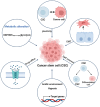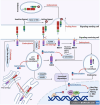New insights into Notch signaling as a crucial pathway of pancreatic cancer stem cell behavior by chrysin-polylactic acid-based nanocomposite
- PMID: 39891818
- PMCID: PMC11787125
- DOI: 10.1007/s12672-025-01846-3
New insights into Notch signaling as a crucial pathway of pancreatic cancer stem cell behavior by chrysin-polylactic acid-based nanocomposite
Abstract
Pancreatic cancer is an extremely deadly illness for which there are few reliable treatments. Recent research indicates that malignant tumors are highly variable and consist of a tiny subset of unique cancer cells, known as cancer stem cells (CSCs), which are responsible for the beginning and spread of tumors. These cells are typically identified by the expression of specific cell surface markers. A population of pancreatic cancer stem cells with aberrantly active developmental signaling pathways has been identified in recent studies of human pancreatic tumors. Among these Notch signaling pathway has been identified as a key regulator of CSCs self-renewal, making it an attractive target for therapeutic intervention. Chrysin-loaded polylactic acid (PLA) as polymeric nanoparticles systems have been growing interest in using as platforms for improved drug delivery. This review aims to explore innovative strategies for targeted therapy and optimized drug delivery in pancreatic CSCs by manipulating the Notch pathway and leveraging PLA-based drug delivery systems. Furthermore, we will assess the capability of PLA nanoparticles to enhance the bioavailability and effectiveness of gemcitabine in pancreatic cancer cells. The insights gained from this review have the potential to contribute to the development of novel treatment approaches that combine targeted therapy with advanced drug delivery utilizing biodegradable polymeric nanoparticles.
Keywords: Cancer stem cells; Chrysin; Notch pathway; Pancreatic cancer; Polylactic acid.
© 2025. The Author(s).
Conflict of interest statement
Declarations. Ethics approval and consent to participate: Not applicable. Informed consent: Not applicable. Competing interests: The authors declare no competing interests.
Figures






References
-
- Tan P, et al. Artificial intelligence aids in development of nanomedicines for cancer management. Amsterdam: Elsevier; 2023. - PubMed
Publication types
LinkOut - more resources
Full Text Sources
